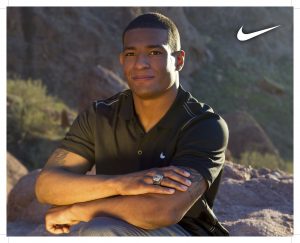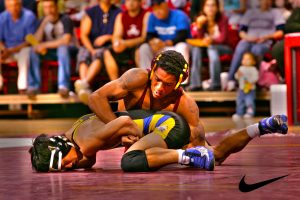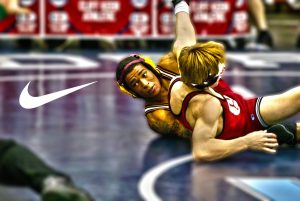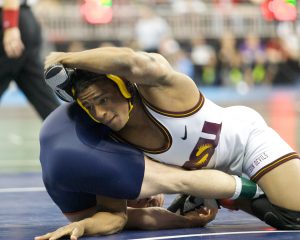“Wrestling allowed me to show people what I can do” – Anthony Robles on his incredible journey to becoming national champion
Very rarely do you meet someone with quite as inspirational a story as Anthony Robles – 2011 NCAA wrestling national champion.
He became a national champion despite being neglected by all top tier colleges, he was undefeated in his last two years of high school despite only starting the sport at the age of 14.
But most remarkably of all, Anthony achieved all this despite being born without his right leg. His story is truly incredible.
“My mum had me when she was 16 years old and I was born missing my leg,” he began. “Not even the doctors expected me to be born missing it.
“I’ve never met my biological father and my step-dad was always in and out of the picture growing up so really it was my mum that was the rock of the household. She taught me to never see my disability as a disability. She just taught me to see it as a challenge – as something that I’d have to learn to overcome.
“There were certain things I’d have to learn how to do differently but she showed me that it would never be something that would hold me back in my life unless I allowed it to.”

Robles’ beginning in life may have been unique, but it made him more susceptible to the very common childhood feelings of isolation and loneliness.
“My family never made it a big deal that I was missing my leg,” he said. “So for the longest time I grew up thinking that me missing a leg wasn’t a big deal.
“However, when I started school all the other kids did see it as a big deal. They would stare at me and ask questions, some of them would make fun of me. For the longest time I felt like I was an outsider, I felt like I couldn’t fit – I was very uncomfortable.”
It was the sport of wrestling, as well as some of his coaches and fellow wrestlers, that gave Robles an avenue to begin to feel comfortable in his skin.
But it could have all been so different. A move from California to Arizona brought him closer to his cousin who was desperate to get him into the sport, but a reluctant teenage Robles tried his best to avoid the sport in the beginning.
“Right before I was starting my first year of high school I spent a lot of time with my cousin because he was about three years older than me and he actually wrestled,” Robles said.
“When I was living in California whenever we talked on the phone he would always say: ‘you should try out for the wrestling team. You might like it’. I would always kind of brush it aside saying, I don’t really think that’s for me. I’m not really interested but I’ll think about it. Spending that summer with him, he used to take me to his wrestling practices and I would sit on the side and watch the guys do their moves and one day his coach asked me if I wanted to try it out.
“I actually turned his coach down and after he walked away, my cousin walked up to me and started talking about it to me again. I went out there and tried it because I just wanted my cousin to leave me alone.
“I remember I got thrown around the room, the guy I was wrestling with just beat me up but I walked away from that match with a spark, with a passion for the sport. I was excited because I felt that even though I wasn’t good at that moment that wrestling would allow me to show people what I’m capable of.”

This sentiment encapsulates Robles as both an athlete and a man. He doesn’t see challenges as intimidating, but exciting.
It makes sense, once he had learned to cope with life without a limb every other challenge didn’t quite seem as daunting.
“Initially when people first met me growing up the first thing that they would see is me missing a leg,” he explained. “They’d ask me what happened or I could just tell that they felt sorry for me and I was just frustrated growing up with that.
“I felt that wrestling was my way of showing them that it doesn’t matter what I don’t have, you don’t have to feel sorry for me because I can do this, I can do anything I set my mind to. I can be the best wrestler in the country and so that’s what kind of gave me that passion for it. It allowed me to show people what I could do finally.”
And boy did he show them what he could do.
After a disappointing high school freshman year in the sport, where he finished dead last in his city tournament in Mesa, Robles went from strength to strength.
He climbed to seventh in his sophomore year before his incredible 96 match unbeaten run across his junior and senior years where he became the back-to-back high school state champion.
Crucial to this change in fortunes was Robles’ change of mindset to embrace his differences and try to use them to his advantage – a revelation he accredits to his high school wrestling coach Bobby Williams.
“That [the change in attitude] was actually all to do with my wrestling coach, Bobby Williams,” Robles said. “He really started to help me learn how to use my strengths.
“’Our ‘strategy’ he called it. He said: ‘we’re going to focus on your strengths and camouflage your weaknesses’. Everybody would say: ‘okay he’s missing his leg, he can’t stand up and wrestle’ so that’s when coach said: ‘okay we’re going to put you in a tripod stance to put you down low on the mat so now your opponents have to attack you. But to do that they have to put their hands on you first’. So basically they had to attack my strengths which is my upper body. Little by little we started adding to it and it really came together pretty well.”
Were it anyone else, 96 matches unbeaten would have opened the doors to all sorts of ‘full-ride’ scholarships to some of the best wrestling colleges in the country. For Robles, this wasn’t the case.
Despite having his heart set on a place at Iowa University – one of the most reputable wrestling colleges in the country, an offer never came.
“It was extremely disappointing,” he said. “Because I remember after winning my high school state title I wasn’t getting recruited. In my senior year I wasn’t getting letters or phone calls so we sat down with my coach, my family and he said: ‘okay we need to send you to the national tournament’.
“He said: ‘if you win it then that’ll show the colleges that you can compete with the best in the country at that level’. So I went to the high school nationals and actually won and so then I was expecting full ride scholarships to come and still the answer was no.”

For such a positive guy with an incredible outlook on life, there was a real emotion in his voice as he talked about being overlooked in favour of guys he had beaten consistently over the past two years – purely because of his disability.
“The majority of the schools didn’t want to take a chance on me because they said I was about thirty pounds too light to wrestle the lightest weight class in college and also because it was Division One wrestling. It was the best of the best in the country and they just didn’t think I could compete there because of my leg.
“It was upsetting because I remember a lot of the guys that I had beaten at the high school national tournament had scholarships and here I was – I didn’t get anything.”
In true Robles fashion he somehow managed to turn this into a positive, and used the disappointment as inspiration when things got difficult on his journey to the top.
“I think in the long run it just helped to kind of fuel me and motivate me because I felt like I had to prove a lot of people wrong,” he said.
“There were plenty of times where I thought about quitting or I doubted myself and one of the things that did motivate me through those times was thinking: ‘if I quit now I’m going to prove all those coaches right who didn’t recruit me, who said I couldn’t cut it at the big level’ – the people who said I couldn’t be a national champion.”
In a climax of Hollywood proportions, four years after being shunned by his dream programme at Iowa, Robles was to face Matt McDonough – Iowa’s prized wrestling asset – in his national championship fight.
This was exactly what Robles wanted – a chance to finally prove all of his doubters wrong and show that he could beat the ‘best of the best’.
“I didn’t want to have it any other way,” he said, remembering the fight. “I didn’t want people to say: ‘yeah he won a national title but the other best guy in his weight class didn’t make it or he got injured’ or anything like that. I wanted to go out against the best, to beat the best and leave no question in anyone’s mind.
“It [Iowa] was arguably the best programme in college at that time and really the college that was my dream, the college that I wanted to be like so it was an honour for me to finish off against them – the best of the best.”
The victory came in resounding fashion – 7-1 against the reigning champion McDonough. Robles classes the final seconds of that fight as the fondest of his life so far.
“I just remember being on that wrestling mat as the last second ticked off the clock,” he said. “I just remember closing my eyes and putting my head down on the mat. I opened my eyes and I pointed to the sky and I just looked up high to the Arizona state section and all the special people in my life were there.
“That moment right there just solidified everything that I was working for. It showed me that anything was possible. There were plenty of times I really wanted to quit and I remember thinking at that moment that it was all worth it. If I could just experience this for a second as I was going through that nine-year journey I would have trained for eighteen years to get this, you know, so that’s something I still think about on a daily basis.
“It was very satisfying. I always have a lot of respect for the Iowa wrestling programme and for Matt McDonough, you know, I respect him a ton. Really, for me it was an honour to end my career that way.”
Even in this moment, at the culmination of his nine-year journey, after he had just defeated the best wrestler at the best university in the country, Robles still had to answer to the critics. Critics, it must be added, that were now bordering on desperate.
They accused Robles – incredibly – of having an advantage due to being born with one leg.
“When I first started hearing that it really made me mad,” he told me. “I was extremely frustrated because I felt like people were taking away all the hard work I had put in, all the summers I spent training every single day, lifting weights and wrestling – they didn’t see that.
“They were acting like I just walked on the wrestling mat and all of a sudden I was good and winning all these wrestling matches.
The apportion of blame to someone who has overcome so many obstacles both off and on the wrestling mat and turned his biggest weakness into his greatest strength is indicative of many excuse-filled sporting cultures.

Not only does Robles represent the absolute antithesis of an excuse-filled athlete – he turned this renewed criticism into yet another positive, viewing it as proof that he had fulfilled both his off-field journey as well as the one on the wrestling mat.
“It actually made me happy when people started to refer to me winning a national championship as unfair,” he added with a smile. “When I started the sport and all through my life I never wanted people to feel sorry for me because I was missing my leg.
“Now I felt like I was accomplishing my goal because I was so good people were saying it was unfair for the other guy – somehow me missing a leg was taken as an advantage over the guy that had two legs.
“Even though it is disrespectful to me, in a way it kind of helped me accomplish my goal. It was gratifying for me personally because I wasn’t the sympathy case anymore.”
Surprisingly, it was at this pinnacle that Robles decided to call time on his incredible wrestling career.
With the London Olympics only 12 months on from his national championship win, he admitted that his decision surprised a few people in the sport.
“When I got into wrestling my heart was in it, I loved the sport,” he said. “I wanted to be the best at it.
“It would have been an honour to represent my country and of course I would have loved to possibly win a medal but I knew to compete at that level I had to be all in and I just thought that I didn’t want to disrespect the sport like that. It had already given me so much I felt like it was time for another chapter in my life.”
The reason for his change of heart, as if the man could have any more surprises in him, was that he wanted to pursue a career in motivational speaking – something he still does to this day.
What reason could a potential Olympic champion have for giving up his sport to focus on speaking you might ask? I could have guessed the answer well before I asked the question.
“I chose that because there are a lot of people in my life who helped me, motivated me and inspired me to overcome my own obstacles and challenges,” he said.
“They inspired me to get into speaking because I feel like it’s my way of helping others overcome their challenges to reach their dreams and reach their goals.”
As our interview came to a close it became obvious that his story could be right out of a blockbuster film, but despite the fame and glory he has amassed throughout his career it is Robles’ incredible grounded attitude that sets him aside from any athlete I’ve ever met.
He remembers where he has come from, as well as the scale of the difficulties he has overcome in his life to get to the peak of his sport. Rather than sit back and admire the journey from his lofty heights, he was determined to run down to the bottom and do everything he could to make that journey easier for others.
Far from forgetting his extraordinary story, he now simply uses it as his motivation in everyday, ordinary life.
“It motivates me now when I’m trying to chase other dreams I have. When I’m struggling, when I’m frustrated, when things aren’t going my way I think about it and I think ‘this is nowhere near as hard as it was to get to that’.”
With an attitude like that, there is every reason to believe he will be even more successful on the stage than he was on the mat.
Featured image credit: Gary Lewis
All other non credited images: Gary Lewis